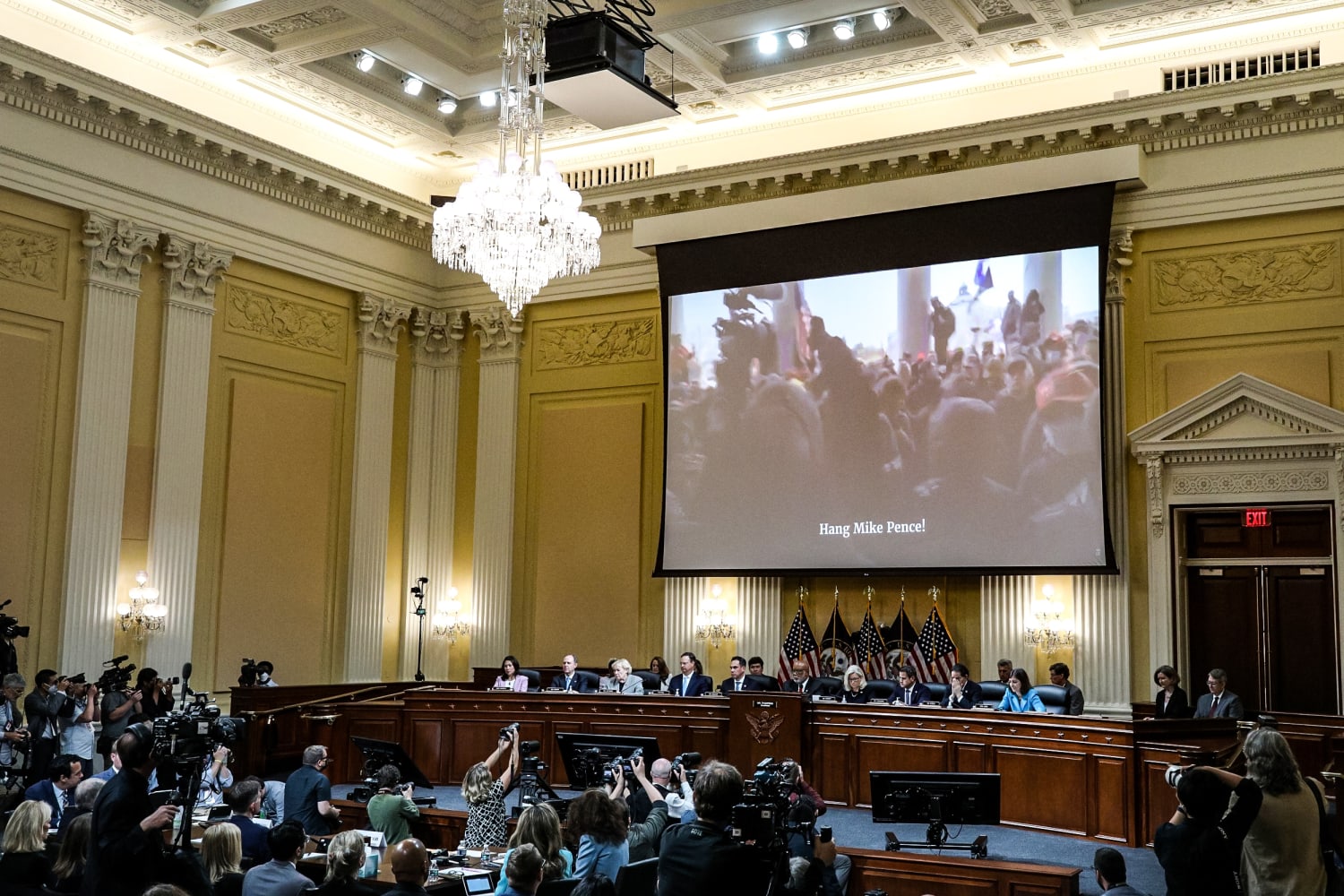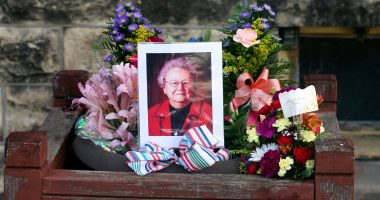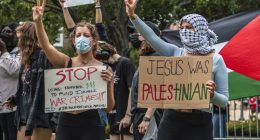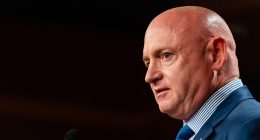WASHINGTON — The House Jan. 6 committee turned its focus Thursday to former President Donald Trump’s attempts to pressure then-Vice President Mike Pence into refusing to certify the 2020 election results.
At its third public hearing, the bipartisan panel argued that effort was the central component of an illegal conspiracy to keep Trump in power — one that put the republic, and Pence, in mortal danger.
Thrust into the role of pivotal player in the key moment, Pence chose the Constitution over Trump — and over his own interest in remaining vice president — members of the panel said. That turned Pence, who is widely viewed as a possible 2024 presidential candidate, into an unexpected hero for Democrats, anti-Trump Republicans and the republic.
“Donald Trump wanted Mike Pence to do something no other Vice President has ever done: the former President wanted Pence to reject the votes and either declare Trump the winner or send the votes back to the states to be counted again,” panel Chairman Bennie Thompson, D-Miss., said before casting Pence, his longtime political adversary, in the role of democracy’s champion.
“Mike Pence said no,” Thompson continued. “He resisted the pressure. He knew it was illegal. He knew it was wrong.”
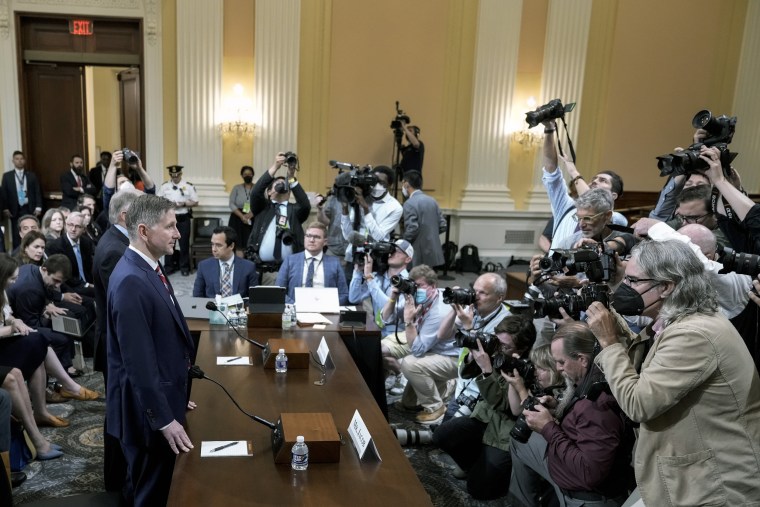
The pressure included Trump berating Pence, calling him “the ‘p’ word,” in a phone call on the morning of Jan. 6, according to recorded testimony from Julie Radford, a former chief of staff to Ivanka Trump, the president’s daughter.
The president was furious that his vice president still intended to defy him.
Ivanka Trump was one of several family members and top aides who were present in the Oval Office with Trump during the call. Pence about two miles away was at the vice president’s residence at the U.S. Naval Observatory. In her own testimony, Ivanka Trump said the discussion became “pretty heated” and that her father used a “different tone” than he had with Pence in the past.
Presiding over the certification of the electoral vote is one of the few official duties of the vice president, but Trump had embraced a fringe theory that Pence could unilaterally overturn the result. The committee aimed to show that Trump pushed the plan even though White House lawyers had told him it was against the law.
Committee aides say testimony from Pence advisers, including former Circuit Court Judge J. Michael Luttig and Pence counsel Greg Jacob, help shed new light on the “pressure campaign,” which Trump undertook both publicly and privately.
In a clip of prior testimony behind closed doors, Jacob said that John Eastman, a lawyer promoting the plan, told Trump that it was not legal on Jan. 4. In another clip, Eric Herschmann, a Trump White House lawyer, said he had discussed with Eastman the potential dangers of the plan.
“I said, ‘You’re going to cause riots in the streets,'” Herschmann recalled. “And he said words to the effect of, ‘There’s been violence in the history of our country, Eric, in order to protect the democracy or protect the republic.’”
Indeed, violence was discussed and anticipated by both proponents and opponents of Eastman’s plan for Pence to steal the election, according to witness testimony.
Eastman would later ask longtime Trump adviser Rudy Giuliani to include him on a list of hopefuls for presidential pardons, according to an email presented by the committee. In his recorded appearance before the panel, Eastman repeatedly invoked his Fifth Amendment right to not incriminate himself when asked about his conduct.
As Pence prepared a public statement explaining why he would certify the electoral votes, Jacob testified, Pence focused on what he viewed as his duty to the Constitution and the American public.
“The vice president said, ‘This may be the most important thing I ever say,'” Jacob said in recorded testimony.
During Thursday’s hearing, Jacob testified that it was Pence’s “first instinct” to reject the idea that one man — the vice president — could overturn the will of voters when he was first apprised of the concept in early December 2020.
Nonetheless, at a “Stop the Steal” rally that preceded the Jan. 6 insurrection, Trump repeatedly urged Pence to interfere with the electoral vote count and then told his supporters to march on the Capitol.
Had Pence obeyed Trump’s order, that would have “plunged America into what I believe would have been tantamount to a revolution within a constitutional crisis,” Luttig, a leading conservative legal scholar, said under questioning from Rep. Liz Cheney, R-Wyo., the vice-chair of the committee.
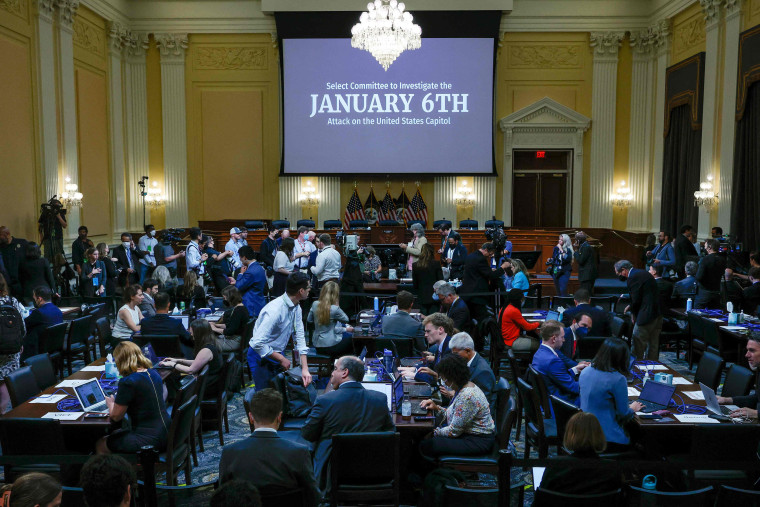
That, Luttig said, “would have been the first constitutional crisis since the founding of the republic.”
Pence stood his ground, but the ballot-counting procedure was disrupted when Trump supporters attacked the Capitol.
Inside the building, Pence narrowly avoided a confrontation with rioters, some of whom were calling for him to be hanged for disloyalty to Trump. Even when it was clear that Pence’s safety was at risk, Trump chided his vice president.
“He [Trump] knew that there was violence and he still tweeted the vice president didn’t have the courage to do what was necessary,” Rep. Pete Aguilar, D-Calif., a member of the committee who will take a prominent role in Thursday’s hearing, told NBC News in an exclusive interview.
While Pence has become reviled by Trump’s political base, he has sought to capitalize on his Jan. 6 actions in building a possible presidential campaign. He has visited the early voting states of Iowa and New Hampshire and has challenged Trump in public remarks.
In a February speech to the conservative Federalist Society in Orlando, Pence delivered a concise analysis.
“I heard this week that President Trump said I had the right to overturn the election,” Pence said. “President Trump is wrong.”
The hearing Thursday is the third of the committee’s seven planned public sessions.
Source: | This article originally belongs to Nbcnews.com


